#the sacrifice is a lot more metaphorical. and also its sort of a.
Explore tagged Tumblr posts
Text

hear me out: transfem yuri.


i really love this picrew its soooo cutes.. mykir forever 🫶🫶
edit i made yuri real also.


#yes this is an excuse to spread odette propaganda#would you like to hear my 10 page essay on odette and how transfem mytho is the true ending?#see it all starts with tutu herself—more specifically the fact that she is in one of mythos heart shards#so now tutu is basically mytho/siegfrieds dragsona who he pretends is his love interest#the sacrifice is a lot more metaphorical. and also its sort of a.#siegfried giving up his true identity to inspire hope thing.#BUT THIS ALSO REFRAMES THE MAIN STORY BEAUTIFULLY#one of my FAVORITEEE things abt ptutu is that its ultimately a subversion of the classic fairytale love story#and what better way to do that!! than to make it trans!!#and the SYMBOLISM. the THEMES. the inherent tragedy in your truest self rebuilding your mask knowing it will never reflect her.#hoping against all hope that you can be Happy.#and it is only! in the darkest hour! when your love (who is also transfem thats another essay) has been taken from you.#when you witness a mere duck harness the hope of your true self.#that you realize what you need to do to win. you need to be brave. you need to have hope for your future.#um its also how ruetho can still win. cringefail transfem yuri with mutual struggles about choice and narratives yippee!!!!!#odette....odette the strong contender for my fave character.....despite not being canon.......#i have an actual art abt her on this blog. if u wanna see that.#my posts
33 notes
·
View notes
Text
So I guess this is a good time to do a recap of some old Ukitake posts: [1][2][3][4][5][6]
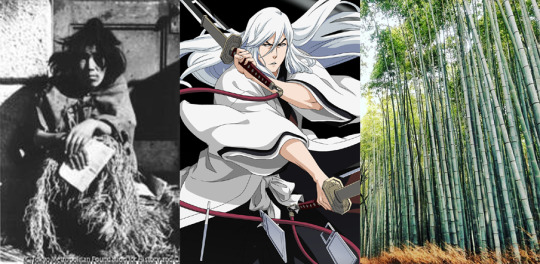
Ukitake[浮竹] Juushirou[十四郎] actually has one of my favorite names in the series as it feels like it says a lot about his core concept beyond what we're really given in canon. The family name reads uki-[浮]: "Floating" and take-[竹]: "Bamboo." That same "floating" is part of the word fuurou[浮浪]: "vagrant/vagabond" and a few other colloquial terms, a generally circling around a homeless person or a drifter. (In fact the other half of that compound word, [浪] is the "wave" in ronin[浪人]: "wave man/person" as in a masterless samurai.) Bamboo being a staple lumber in Japan of course but also notorious for its fast and rampant growth, as it is quick to spread and choke out other plants in an environment. The idea of "floating..." or "vagrant bamboo" gives an impression of being plentiful and common, even excessive.
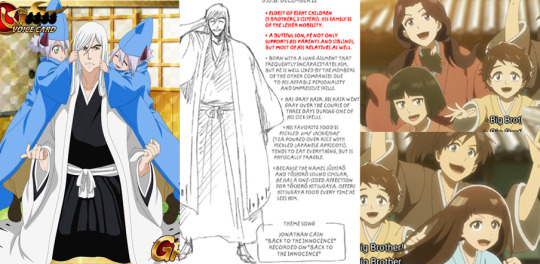
The personal name, Juushirou[十四郎] just reads "14(th) Son" which always implied he came from a large family. A profile in the back of vol. 18 long ago confirmed he had brothers and sisters, but curiously all younger than him. The implication seemed clear that as a sickly person from a big family, he was poor and that there were 13 prior children who died before him, which is really the only reason you'd name a child the way they did. This feels like it works in tandem with the family name to again emphasize a family of many, but also almost expendable. The big family is also why he's got an affinity for children
That said it always felt to me like the backstory should have been more grim? Like rather than just praying to a god to save his life, it seemed more like he should have been a sacrifice made to ensure the family line continued. Like first 13 kids died, they were afraid he was their last chance, but he was sickly, so they sacrificed him to basically ensure the next ones would come out alright. Hence the kids younger than him surviving in spite of the ominous past implied by his name.
(Also the "shiro" phonetics in his name as a homonym with shiro[白]:white point to his hair. Kubo makes an explicit joke about this as Toshiro, also white haired, shares a similar wordplay, his name Toshirou[冬獅郎] meaning "Winter Lion Son.")
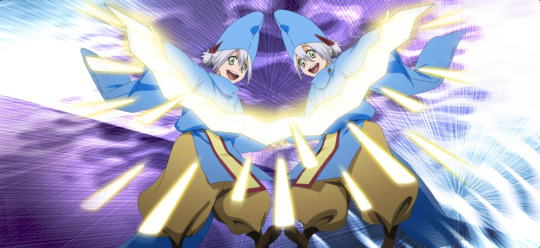
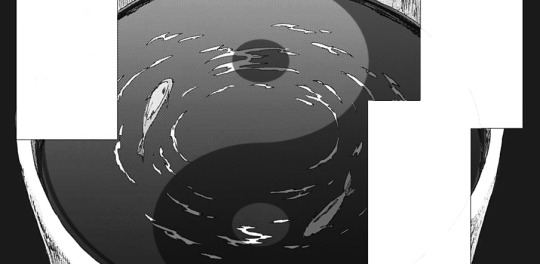
Then there's his shikai, Sougyo-no-Kotowari[双魚理] which reads "PairFish's Reason/Logic/Natural way of things." (sougyo-kyu[双魚宮] is the Japanese name of the constellation Pisces.) It appears to be an allusion to daoism/onmyodo, and the yin-yang diagram of balance, and this theme gets built upon by other contextual information like the zanpakutou arc's designs borrowing from onmyoji, and Ukitake's presence in conjunction with fish imagery and metaphor in the Jaws of Hell arc.
The little preamble to that chapter, about the two fish in balance until one dies and then the other grows bigger, is itself synonymous with sougyo-no-kotowari: The Natural Order of Two Fish.
The release command [波悉く我が盾となれ]: "All Waves be my shield," [雷悉く我が刃となれ]: "All LightningBolts be my blade" is fairly straight forward and just evokes the image of a stormy sea, which actually seems to have surprisingly little to do with the rest of the themes in play? I mean sure, waves and fish and floating, but when the floating and fish are less than literal the waves and lightning without any additional reading feel kind of out of place?
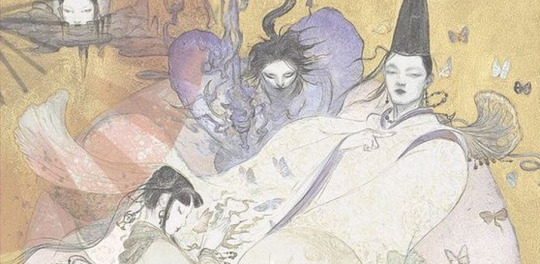
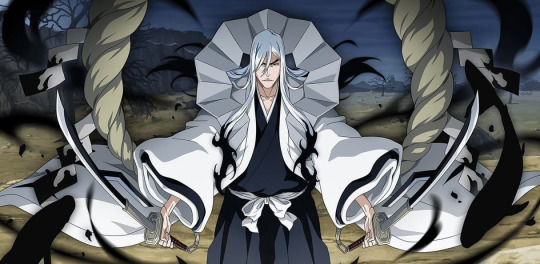
Of note: the onymoji was a prestigious class of sort of advisor in the japanese imperial court was at its peak in the Heian period, the long standing era of peace in ancient Japan that came just before the descent into the civil war of the Sengoku period. (Subsequently the onmyoji lost most of their power and clout during the waring states period as power shifted from the imperial court to the shogunate.) They were associated with and consulted for a wide range of things from medicine, to architecture, to city planning and meteorology, and divination, and perhaps most well loved by media, as exorcists. This ties into things like his beyond bankai form in Bleach Brave Souls where they opt for a more shinto purification theme, in either case making him fit something of a paragon role as Shinigami as ""cleansing"" hollows rather than destroying them.
Actually those shinto motifs all link to the recent addition of shinto themes in Mimihagi pretty directly, but I'll get to that in a bit...
It's worth noting that with Kyoraku's emphasis on a leisurely city life in the capital(Kyoto), and the onmyo mystic themes of Sougyo-no-kotowari, Kyoraku and Ukitake appear to both represent aspects of the Heian period, and thus cultures that predate the Sengoku period, and the rise of the samurai, lending to their role as two of the most senior members of the gotei 13.

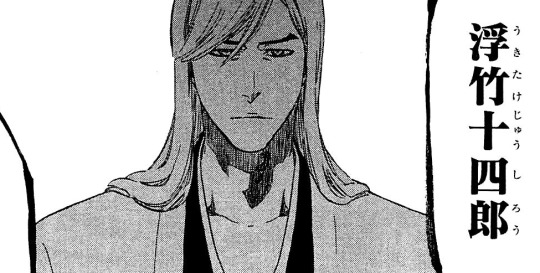
People often forget but technicaly Ukitake was the first captain we were introduced to, well before Byakuya showed up, the Captain title just wasn't present at the time. When Rukia has her flashback to a then uncertain event while Ichigo fights Grandfisher, it's Ukitake she's hearing speak and that we catch just a brief glimpse of the back of the head of. Like I said there were no captain ranks in the story a that point, so he just appears as long flowing white hair over an all black shihakusho. I think his hair was always meant to help him embody an element of balance between black and white, and thus the very series title: Bleach.
I think there was always an implicit siniste quality to the idea of "Balance" underlying the shinigami that Kubo tried to gesture towards with the general vibe of the Soul Society -v- Rukongai dynamics, the Shibas, that flicker of a twist in the Fullbringer arc that Ichigo just ignored, and even with a lot of the loose and ultimately unfulfilled themes he set up for the TYBW arc with Yhwach's plans for a new world and Juugram's Balance schrift.
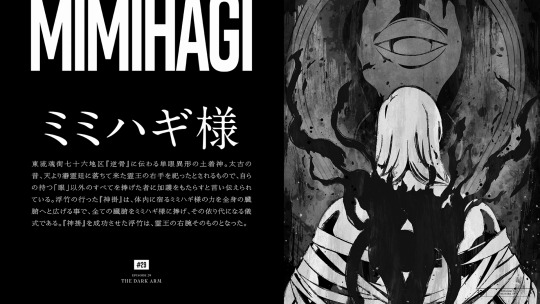
Oh I forgot the whole MIMIHAGI bit, despite teh being the whole subject of this week's episode:
東流魂街七十六地区『逆骨』に伝わる単眼異形の土着神。
An indigenous God of Grotesque/Suspicious Single-eye passed down in East Rukongai 76(th) zone "Sakahone(Reverse Bone)"
太古の昔、天より瀞霊廷に落ちて来た霊王の右手を祀ったとされるもので、自らの持つ「眼」以外のすべてを捧げた者���加護をもたらすと言い伝えられている。
(In)Ancient Times, From Heaven to the Seireitei the fallen right hand of the Rei-Oh is said to have been enshrined.
浮竹の行った『神掛』は、体内に宿るミミハギ様の力を全身の臓腑へと広げる事で、全ての臓腑をミミハギ様に捧げ、その依り代になる儀式である。
Ukitake's performed "Kamikake(God debt)" was, the power of MIMIHAGI dwelling in the body spreading to the whole of the viscera/entrails, offer up all of your entrails to MIMIHAGI-sama, it is a ceremony/ritual to become a Yorishiro*
『神掛』を成功させた浮竹は、霊王の右腕そのものとなった。
Ukitake succeeded at/with "Kamikake", he had become the right hand of the Rei-Oh.
*i don't have a more concise way to translate this... the translation listed run something like "object representative of a divine spirit"/" object to which a spirit is drawn or summoned"/"object or animal occupied by a kami" and it's specifically a shinto thing.
When you see big deified trees with the shimenawa ropes and shide paper talismans, those trees are yorishiro. or rather they're Shintai, because a Yorishiro is a thing capable of being host to a kami, the Shintai is after they've been deified. (And technically when you do that to a person it would be called Yorimashi, not Yorishiro. I don't know if that's meant to specifically dehumanize Ukitake or if its a broad enough term that it doesnt really make a difference. Although if you really wanted to stretch it you could argue that Ukitake is an object and not a person because he did die from his illness and the thing deified wasn't a "living" person it was a corpse. Which would very curiously position him as an inversion of Ichigo, who was human, "died" in that his soul was deliberately severed from his body, but continued to operate as nominally human while getting to dip a toe into the shinigami powers and the spirit world.)
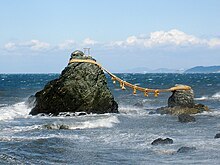
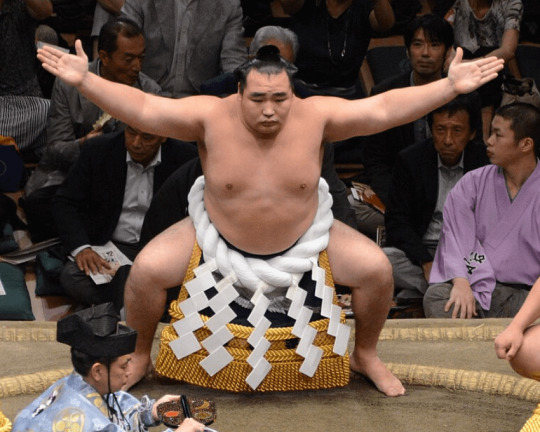

These little eye catch data cards really aren't giving us anything new huh?
#bleach#bleach meta#recap of junk i already posted years ago mostly#some of which i dont even know if id stand by today#but im too selfconcious to really reread my old shit#i know its bad#jushiro ukitake
51 notes
·
View notes
Text

eh. might as well post this now. a few of these are wish fulfillment rather than actual theorizing but explanations under the cut
i have an alchemy hyperfixation and all the alchemy stuff in tmagp makes me very excited so a lot of my theories are related to that
spoilers for the pilot btw
main character gets an eye injury - the image will not leave my head. in the magnus institute ruins statement there was this whole thing about redcanary having some kind of encounter with or experience with eye trauma and that feels like something thats just. gonna come up again
another mechanisms va - self explanatory, we need to complete the set. would love to hear kofi or rachel.
gwen has trauma related to something that happened with elias - this is going on the theory that she’s not elias’ counterpart, but a relative of some kind. something spooky happens to him and that pushes gwen to research the paranormal.
character referencing nicholas flamel - all the main characters have names that reference alchemists, and nicholas flamel is probably the most famous alchemist of all time. i doubt he’ll be given the smirke treatment because that kinda already happened with the transphobic wizard books, but someone could be sharing his name.
mag 114 statement is relevant - thats the. hill top road statement that deals with other realities, and anya (the statement giver) could be from the protocol verse. we could totally hear about the aftermath of her departure
alice/sam/gwen = three primes - the three main alchemical symbols on the OIAR crest, and a good sort of symbolic trio sorter. the three peimes are salt, sulphur and mercury, and are the basis for alchemy. the down to earth, reliable salt, the firey, unpredictable sulfur, and the adaptable, easygoing mercury. i think these could apply i just want to have it called out in universe
lena is a good person - i don’t think they’d pull the evil boss thing twice. i just think lena’s weird mannerisms are from her autistic swag
celia is related to or is agnes - (related to as in. her story involves agnes, not that shes like. a sister.) this comes from a theory by @/pinklotjeart, i think. basically: through the way her death was described (spark returned to the lightless flame) and some timeline discrepancies and general avatarness making it weird, agnes might not be Dead dead. and celia’s counterpart, lynne - well, she saw a fire ghost. also, both her and agnes are the only non one-off characters who have shakespeare names afaik. agnes MONTAGUE, celia from as you like it…
annabelle cane is related somehow - self explanatory, she was at hilltop road when everything went down. might have been pulled in.
a famous alchemist is robert smirke’d - self explaining, give me more canon historical figures jonny
another kitty cat - i want more kitty in podcast is that a crime
augustus is not jonah - we hear jonah’s voice as ben meredith in 193, so im skeptical that tim fearon’s character is jonah for that reason.
oiar group has a messy moment that devolves into actual physical violence - mmm angst i think they deserve to smack eachother around a bit
bonzo cult - yeah.
oiar found family - we got the group of coworkers that hate each other angst last time gimme the “hurting one to get to the others” and self sacrifice angst this time
colin dies early - mmmm i cant say much about this bc its based on one throwaway line at the MCM panel where jonny doesn’t mention colin in the main character group. so . death flags.
oiar is containing the entities scp style - this was a super early theory of mine, either this or theyre using them for power or energy in some way. even more heavy handed capitalism metaphors yay
someone gets ushanka’d - its computer horror: the podcast. that’s all
cookbook statement - a few clues in the ARG had to do with cookbooks, and alex and jonny have already said they’re getting weird with the statement formats (they mentioned an insurance report!) so. cookbook doesn’t seem too far-fetched
tiktoker/influencer character - archives was 2010s and they had a podcaster and youtuber, which were like. the big things. whats the hip trend now??? instagram and tiktok baybee
protocol editors va a small role a la mag 100 or the wtgfs cult - those characters were voiced by other rq team members (ie helen as laverne and martyn as robin) and the team has since expanded!! some editors dis stuff for cry havoc, so im guessing nico, annie, april and others will get a small role!
a villain’s goal is creating the philosopher’s stone or other alchemical thing - tmagp is heavily inspired by alchemy, and the philosopher’s stone was the main goal of alchemy!! it would grant you eternal knowledge snd the ability to turn lead into gold- which seems like a good. evil dude’s ambition
the desolation gets more focus - the institute burned down, the oiar crest has a lot of sulfur symbols (the fire element), alchemy as a whole having to do with fire, celia and her connection- it paints a very. lightless flame picture
trip to germany - a lot of the arg was set in and around berlin, and there was that exchange between sam and colin about german in the pilot! i could see a germany trip happening in the same way jon took a trip to china and america.
124 notes
·
View notes
Text
Goats, Crows and The Flood
Or why Crowley turns the goats into crows in the Job minisode
If you're reading that and thinking "eh, what's the Flood got to do with it?" then read on. It wasn't done just so Crowley got to change his name. It's never as simple as that. C'mon now, this is the GOmens AU, I'm not going to write a meta about something like this and not give you at least three if not four layers as to why, now, am I? Certainly not, and this one won't be any different.

Recently I picked up a book that has been sitting for far too long on a pile near my kitchen that needs sorting through called Parallel Myths* and in it is a section on Flood myths. (It's got lots of other good bits as well, but the Flood myths are what I want to talk about here.) The Flood is a wide-spread myth, with stories all around the world from India, to the Greek myths, to the Incas and Aztecs and in North America as well.
There are four stories that include crows as messengers who are sent to look out for land. The first is our familiar bible story. Oh, did you miss that bit? Yeah, I know, you keep getting told about the dove that represents the holy spirit that came back with the olive branch. Why would they want to tell you about a dirty old crow? And why is that crow dirty anyway? Ah, hold that thought...we'll come back to that shortly.

Another very famous story that include a crow being sent out to look for land after a great Flood is in the epic story of Gilgamesh. While on a journey Gilgamesh meets an old man named Utnaptishtim who tells the hero how he survived a great flood by building a boat after being warned by the gods to do so, and then floating for several days before coming to rest on a mountain top. At first he sent out a dove, but the dove returned. Then he sent out a swallow, but the swallow returned also, so he knew there was no land yet. But the third bird he sent out was a crow, and it didn't come back, so Utnaptishtim knew it was finally safe to leave.
There are also crows mentioned in two North American Flood myths, with the Cree and the Algonquin, and in both stories they are also sent to look out for land.
So why am I telling you this? Because of this:
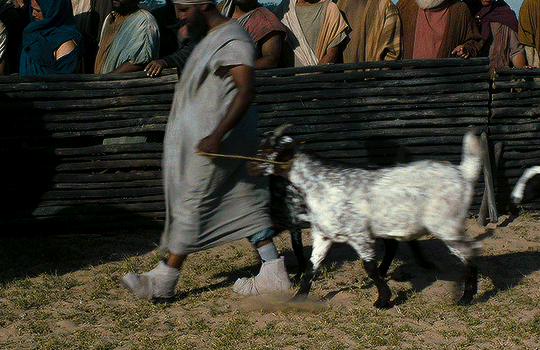
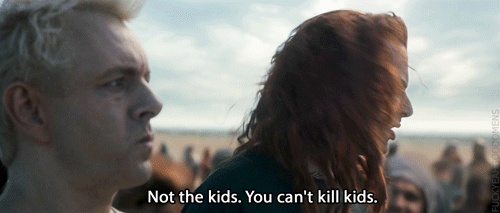
Which is, as we know, is a bit of a play on words, but it establishes the association between the ungulate offspring and the human offspring when we run into the next occurrence of the innocent being killed on the Almighty's fickle whim in the Job minisode in S2. And we know our favourite demon is just not going to take that lying down that without some kind of protest.
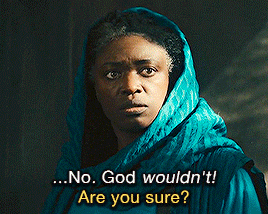

So after delivering his open monologue to the goats, which gives an insight into himself, then being confronted by Aziraphale, and revealing he has a permit, from the Almighty Herself, no less, he turns Job's goats into crows.
(And if you've missed the bit about why the goats, and not the sheep, which the archangels kept going on about, its because sheep were seen as more "Christian" as the rams were considered faithful to their ewes, as good followers should be, but goats were observed to just do it with any-nanny, with no sense of commitment, if you get what I mean, so they were considered more "demonic" in nature.)

The bible seems to have a bit of a love-hate relationship with birds. On hand they can be used for food or sacrifices, on the other hand they are metaphorical demons! There is an association made between "birds of the air" and demons, waiting to pick off the weak (of thought) and young before they can be enfolded into the "safety" of the church.
Even the noble eagle is frowned upon in a way, as it eats carrion, or rotting meat. And that is something ravens and crows are known to do as well. This eating of dead animals, and humans on the field on the ancient battlefield, led crows to be associated with death and the afterlife, and by extension, transformation from one form to another.
(I can't help thinking at this point about the Sandman's assistant crow helper that travels between worlds, but also I've written a couple of metas about both Crowley and the Bentley being facilitators for the crossing of thresholds between different worlds.)
If you've ever had a close association with a crow or two- and I have, over several years, they can be wily opponents! - you come to respect their intelligence and adaptability, no matter how they might be frustrating you! **
The raven is also mentioned in the Book of Job 38:41
Who provideth for the raven his food? when his young ones cry unto God, they wander for lack of meat.
We didn't hear this line delivered to Job during the minisode, though we certainly heard some of the other lines from verses 38 and 39 that come before and after it. God is in the middle of telling Job about the universe, the earth and the creatures upon it, and how She looks after them. The line Jimbriel speaks about the morning stars all singing together is Job 38:7, for example. Just before mentioning this loathsome bird, She mentions that most noble of animals, the lion. But look, She also cares about ugly croaking raven fledglings that seem to get kicked out of the nest as soon as they can fly. How do they fend for themselves? It is seen as the mercy of God that she provides for each of the creatures of the Earth, both the lion and the raven. (Well, there's some interesting metaphorical links riiiight there...I hope I don't need to spell them out....)
So where are we? We've gone from a crow being a messenger for Noah, to kids/goats from the Flood scene in S1E3, to demon-associated goats being transformed into demon-associated crows in the Job minisode in S2E2, just before Job's human kids are saved from destruction by being transformed into geckos - which is also a significant symbolic creature for resurrection (which I explain in another meta.)
You know, I wouldn't be at all surprised if we loop back for a longer look at the Flood in S3. Kids, crows, a transformative experience...
Va-va-voom, here we come!
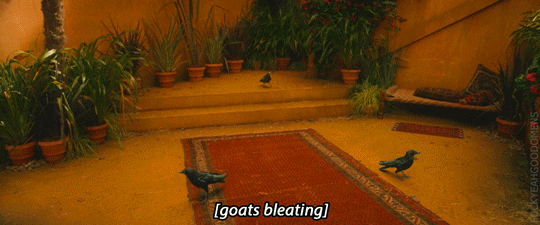
*Parallel Myths by J. F. Beirlein (1994) A Fascinating look at the common threads woven through the world's greatest myths - and the central role they have played through time. ISBN 0-345-38146-7
**I know there are corvids all around the world, and they can be shy, important birds in the ecosystem but here in Australia they can also be big bullies who know they are bigger than the other birds and throw their weight around accordingly and then do gross stuff like dirty up the backyard bird bath by finding discarded sandwiches and dog bones or even Lego blocks and drop them in to "soften" them for later consumption and just leave a filthy mess there for everybird else. yyyiikkk.
#good omens#good omens 2#good omens meta#good omens analysis#good omens theory#crowley#good omens s3#goats#crows#not the kids#the flood
96 notes
·
View notes
Note
Hey man i just wanted to ask something, idk if I'm just dumb or something but even after going over the game several times I don't understand one thing.
When jimmy feeds curly his own leg, when we click on inventory and select curlys leg, the text 'one day he'll thank me' shows up, what does Jimmy mean by that? Why would curly thank him? For feeding him his own flesh?
Also i really, really didn't understand the metaphor behind jimmy feeding curly his own flesh or eating his flesh and the entire cannibalism, auto-caniballism part. I like your analyses a lot and would appreciate it if you explained it. I'm just air headed as fuck.
Oh no there's no worries Anon! you aren't stupid for not understanding this.
Jimmy refers to it like that because he's giving Curly some sort of sustenance before putting him in the crypod, i suppose in a way to give him some sort of fighting chance if he's ever rescued. The crew had been going without food for a long time, and we have no idea how and if Curly was actually fed. He has a hard time swallowing and chewing, and trying to eat laying down is very very difficult. So chances are he ate the least out of everyone.
Jimmy saying "he'll thank me later" is him painting himself as some sort of hero for forcefeeding Curly his own leg on the off chance he gets rescued, he might actually be able to survive with the "food" he's fed. Although Jimmy wasn't doing so hot at this point, so it could also just be him making excuses for what he's doing because its "righteous" in some way.
The metaphor behind the cannibalism and the auto-cannibalism can be interpreted in two different ways.
Either Jimmy, again, rationalising his actions to be actually good and him "fixing" things and taking "responsibility" by ensuring Curly makes it somehow, or it can be seen as a metaphor for Jimmy taking advantage of Curly's vulnerabilities and inability to defend himself. Jimmy is no stranger to manipulating and exploiting one's weakest moments, and he's definitely comfortable doing so with how readily that switch flicks the moment he realises Curly cannot say no or even protect himself. I go over it a bit more here if you're interested.
Chances are Curly wouldn't thank Jimmy for it, but he's telling himself that what he's doing is beneficial in some way. Jimmy has a habit of absolving himself from the guilt or repercussions of his actions by gaslighting himself into thinking that everything he's doing is in some way actually beneficial or just, that he's the hero of the story because of the sacrifices he made to get this far, especially if it involves Curly in some way, with absolutely no care if it hurts the people around either of them.
Thnk you for your question! You are not stupid or dumb for being confused, hopefully this cleared stuff up for you! My inbox is always open if you have questions ⊂(´・◡・⊂ )∘˚˳°
15 notes
·
View notes
Text
I’m sure I’ll add more on this later but as I think on House of Leaves (finished it, loved it, listened through all of Poe’s Haunted and loved that too) I think the conclusion I’ve come to (and this isn’t a wildly novel conclusion, but ah well) is that it is at its core fundamentally an exploration of grief, and specifically grief of the loss of a family member. This is especially obvious because… Mark Danielewski has literally said that it was inspired by the death of his father. Poe’s album as well. So like, this is no secret. And I think this is invoked in the very obvious way of the fact that a house that should feel like a home but instead feels unsafe, surreal, and literally larger and emptier on the inside than it naturally should be is a very clear metaphor for grappling with the loss of a parent, right? But I think it goes deeper than that… I think House of Leaves also spends a lot of time dwelling on the weird, impossible to untangle intricacies of trauma, childhood and generational trauma especially, mental illness, and genetics… the things you carry with you and the things that loom over you from your family, especially those deceased who you no longer have direct contact with, left only with this awareness weighing down upon you.
I think Chad and Daisy are pretty clearly functionally author inserts of Mark and Poe, right? And Will Navidson then is their father? Both are even filmmakers. But I also think that Zampanò himself is Mark as well… his middle initial is literally… But complicatedly I’m not saying that Chad is Zampanò, I don’t think HoL is straightforward like that, it’s more like that’s another embodiment of the grief. The child experiencing that, the adult retelling it, grappling with it, imagining and reimagining it, and I think I believe that Tom Navidson is functionally an author insert of Zampanò into The Navidson Record, functioning kind of like a guardian angel to his childhood self, this sort of stand-in hero character who sacrifices himself to protect the innocence and life of the child self. I think the slippage of “me” within that one line, where he refers to Tom in first person, alludes to this, as well as his emotional outburst over his chapter where he tries to write about the relationship between Will and Tom. And in the very back of the book, there’s the fragment of a typed page where Zampanò considers an ending where Chad and Daisy die instead, are killed by the house, with this much more pessimistic tone (similar to when he gets upset about writing about Tom and Will), than what’s shown in the published/Johnny’s version of The Navidson Record.
And would it complicate things too much to say I think Chad, Zampanò, and Johnny represent a sort of trinity of different stages of Mark’s life—the child experiencing it in real time, the young adult trying (and failing) to cope with it all, and the elder now looking back and engaging with it from an aged perspective. I think Johnny represents that crushing weight of this impending, unknown genetic fuckery, constantly feeling the weight of this figure who died long ago but who you know lives within you, and you’re trying to figure out what’s traumagenic, what’s just this completely unavoidable tumbling towards fate—his mother died severely psychotic in an institution, is this unavoidable? Can he escape this future? How much of what he deals with is her, her influence, her fault, and how much is caused by trauma inflicted upon him. I really don’t like the theory that his mother/Pelafina “was” Johnny all along or that Johnny never existed or that he was a stillborn baby like in the story and she’s functionally created a Johnny headmate. I think it’s sort of silly, like I can see some interesting merit in it (there’s clearly a bizarre Oedipal psychosexual complex going on between Pelafina and Johnny and her writing these detailed accounts of her basically stillborn son’s sexcapades is a pretty fascinating idea), but I’m more interested in a sort of backwards-reading of that theory where the end represents Johnny kind of embracing or succumbing to his mother’s identity, for better or worse, and the idea of this baby in critical condition that maybe just maybe had a slim chance for life but dying the moment his mother asks him to revealing instead his relationship to her, the helplessness of those genetics and the control and power she exerts over him even in death. When Shilo Wallace says “You, I've mistaken for destiny / but the truth is my legacy is not up to my genes” at the end of Repo! the Genetic Opera, House of Leaves says… terrifyingly… what if it is? What if your genetics are your destiny? And then you lose that genetic lineage, it becomes just story, infamy, legend, but you’re there and alive and trying to grapple with it?
I kinda like the theory that Johnny rewrote the end of The Navidson Record to have a happy ending, or maybe Zampanò did. I think they both desperately want the story to have a happier ending. And honestly, I love the ending of The Navidson Record as published by Johnny. Though maybe cliché on paper I love the idea that there is a hopeful answer to all that emptiness and fear and a way to silence those endless inexplicable winding hallways and the answer is to replace that emptiness with genuine love. Like, to overcome that fear and embrace the ones you’ve loved for all that they are and that this love can fix all of that… It can make all of the fear and uncertainty of the empty, insurmountable, nightmare house literally dissolve... I think the end of Poe’s album (“If You Were Here”) speaks to that too.
Uh there’s obviously way more to it than that. House of Leaves is a lot of things. Duh. But I do think right now my primary takeaway is just how informed it is by the crushing helpless grief of the death of an immediate family member with which you have an extremely tenuous or strained relationship and the weight of family history.
#sorry for repo reference in a hol dissertation it’s just the best example I could think of for like a thematic counterargument 😭😭😭#oh would also add Yggdrasil = tree = family trees#house of leaves#I was scared to tag this cuz ik people feel strongly abt their theories but here I guess
30 notes
·
View notes
Text
“Open up your heart, ꨄ︎
Like the gates of hell.”
⊱ ─── ⋅ʚ♡ɞ⋅ ─── ⊰


Mitski’s Laurel Hell is often a criticized and undervalued project, but one of its most enticing and talked about features is its menacing lyrics that paired with enthusiastic, 80s pop-like production.
One of the best examples of this is the masterpiece’s 3rd track, “Stay Soft”, with its catchy chorus and poetic lyrics. While its true meaning is debated upon, it’s obvious its themes are both emotional and sexual.
On my first few listens of the song, it seemed surface level. Mitski’s presumed “lover” was hard-headed and cruel, and took out their anger on her. She displays this through metaphors, going as far to compare them to a knife, and even hell itself.
“Like a knife, It glints in your eye.”
I worked out that Mitski found the need to have their approval, and was fine with being their punching bag. It also seemed as though her lover used to be innocent, but that vulnerability caused them to “toughen up”.
With a now more closer observation of the lyrics, there’s a lot more to it. I still find my original meaning somewhat right, but there’s a deeper complexity to it and some evidence I underlooked. One of the main components of the song was the implication of sexual actions in the lyrics. A couple of the lines go,
“I am face down on my bed, Still not quite awake yet. Thinking of you, I tuck my hand under my weight.”
This looks like it’s referring to masturbation, or is at least intimate in some way, especially when compared to the rest of the lyrics. Even the chorus can be interpreted as erotic,
“You stay soft, get beaten. Only natural to harden up.”
With all this in my mind, we can dive a bit deeper into what Mitski is portraying here. Like said earlier, interpretations vary between person, but what I think is that Mitski is destroying herself here. She is staying with someone who is not in tune with their emotions, and who uses her as an outlet for them. Mitski displays a sexual need where she sacrifices herself and becomes sort of a succbus to this person. She’s a reliever, letting them take out their thoughts and feeling onto her, opening themselves up and dumping out their contents onto her. She is their savior, someone to leech off of. Mitski desires this person as well, wanting them to open up to her and see her as worthy to them, but they can’t due to their unavailability.
Because of this abuse, Mitski ends up killing her own emotions. She gets “beaten up”, letting herself become vulnerable to this person and paying the consequences for it.
I saw this while researching for this, but multiple people talked about Mitski’s ethnicity playing a role as well. Asian women are often seen as “innocent” and “protecting”, as a mother-like figure for white men. Mitski is being taken advantage of and fetishized, but at the same time doesn’t have the value that a white woman would, which is why she can’t seem to find an actual connection in this relationship.
You can also find evidence for this in the music video, where the creatures that drag Mitski away seem to depict white women, with their pale skin and straight, platinum hair. The music video also helps with the interpreting as well. I suggest to go check it out, it’s one of the best I’ve ever seen.
Stay Soft is very clearly not an innocent song. It’s packed with deep and shocking meanings, despite its pop sound. It’s one of Mitski’s best, in my opinion, and really shines the meaning of Laurel Hell thoroughly.
⊱ ─── ⋅ʚ♡ɞ⋅ ─── ⊰
#mitski#mitski posting#mitski lyrics#laurel hell#music#music lyrics#music video#lyrics#indie music#lyric posting#Spotify#fiona apple#musicians#mitski photos#mitski songs#pop music#i bet on losing dogs#musician
12 notes
·
View notes
Text
this is just a collection of highlights from my last Goofy Presentation Night in which i discussed (read: forced my audience to listen to) orv/yhk thoughts for two hundred and ten minutes
ill add more and rb/tag accordingly n stuff later bc its a lot of words to post and i am one very eepy boy
ON DOKSOO
In 1973, Ursula LeGuin wrote the short story The Ones Who Walk Away From Omelas, which, if you’ve been around the English side of ORV fandom for long enough, might recognize due to jomeimei, our yhk scholar’s writings. If you don’t know it, the basic premise of the work is that there exists in some far-flung imagined world, a utopia called Omelas that is perfect in every way, save for the fact that its perfection is maintained via the constant suffering of a small child. (One can surmise from the title of course, that there are those who upon learning this, choose to leave the city and live elsewhere.)
One of the ways this intersects with ORV comes in the Epilogues and what happened to the Avatar of Han Sooyoung living in the 1863rd round. The Han Sooyoung of that round, if you recall, found post-suicide attempt Kim Dokja in the “real” world while looking for the author of Three Ways. Judging by her reactions, we see she has two epiphanies:
EPIPHANY ONE: There was no tls123. It was nearing the end of the year that Three Ways was published (in her and Kim Dokja’s memories), but the novel had not been published yet. The only people with knowledge of the original Three Ways timeline in the world were herself and the Dokkaebi King. If she didn't do anything, if she simply sat back and let the year finish out, she could leave WOS as an unpleasant memory and nothing more. She could save the world.
EPIPHANY TWO: Kim "Three Ways to Survive in a Ruined World saved my life" Dokja would not survive without that story.
She is faced with the same dilemma those who left Omelas were faced with: does she condemn the world to save this child, or does she save the world but condemn this child?
Let's leave that thought to simmer for a while.
Now the moral quandary that she’s dealing with is similar in structure to the Trolley Problem. (Which, if the reader of this has been living blissfully unexposed to 20th century philosophy and 21st century bastardizations of such, is a moral thought experiment in which a tram is headed down a track towards five people, with a lever allowing one to switch the tracks placed before the subject. However, the second track has one person on it who will also surely die from a direct hit by the trolley. Does the subject choose action or inaction?)
And this decision, which, according to other iterations of the Trolley Problem (in which the one person is someone the subject knows and cares about) is still not even in line with those theories or justifications.
ORV is utterly rife with these sort of fun moral messes. There are countless moments in which characters are faced with needs-of-the-many versus needs-of-the-few. Kim Dokja, for one, is perhaps most memorable for these given his propensity for (continuing with the Trolley Problem metaphor) throwing himself onto the track before the tram can reach the fork.
The events of the 1863rd round (and its aftereffects) are the most direct parallel of the experiment.
As has been established, Han Sooyoung of the 1863rd round only knew Kim Dokja for a week, if even that, and yet she is fully willing to burn the world to make sure a life in which he might be happy is given to him. This decision is even further warped when we consider that the moment of her epiphany(s) is not the first time this Han Sooyoung was faced with the Trolley Problem.
We know that (based on the conversations she has with Kim Dokja) in the 1863rd round, Han Sooyoung was operating in a utilitarian space in order to seamlessly complete the scenarios. She chose to sacrifice Yoo Joonghyuk and put him in the position of a “villain” (thereby making him spiritually “dead” to all his loved ones and peers) in order to make sure she made a perfect run. And arguably she did–upon arriving in the 1863rd round Kim Dokja (loathe though he is to admit it) cannot find fault with how she has completed the scenarios thus far, and is even (if I remember correctly) somewhat jealous of her for being able to orchestrate such a clean run.
But instead of working with her to finish her run, to draw the period marking the end of the story she’s made, Kim Dokja’s desire to save Yoo Joonghyuk outweighs his desire to save the world, and he steps in and tears it into a comma. (Yes, I’m deliberately referencing the epilogues. No, I haven’t stopped thinking about the fucking period/comma scene. Don’t talk to me.) He switches the lever back to the track with five people because he refuses to sit back and allow the one man to die.
Now, based on what we see of Han Sooyoung in this round and her immediate reaction to Kim Dokja’s dickery, she would have continued operating in her ends-justify-the-means space. She obviously does to some extent as she reaches the end of the scenarios and wrangles the Dokkaebi King into granting her a wish. Upon arriving in the “real” world she is fully prepared to kill tls123 and save the world. But she doesn’t, she has the key to saving the world in her hands, she could so very easily keep Yoo Joonghyuk from suffering a thousand lives, she could save billions of people and live a wildly successful life as a famous webnovel author but! She! Doesn’t!
Why?
Imagine for a moment, if you will, sitting in a hospital room across from a fifteen year-old boy, sleeping or unconscious, fresh from a suicide attempt. Imagine for a moment, if you will, having met this fifteen year-old boy in another life when he was no longer quite so small or physically close to death, but was equally (if not more) close to it in spirit. Imagine for a moment, if you will, knowing the exact thing that will keep this boy if not happy, then at least surviving, for long enough that you might meet him again. Imagine for a moment, if you will, knowing that withholding that thing is certain death for this boy.
How could she condemn him then? How could she, after knowing the depth with which he will love and will fight to save those he wants to save, leave him here to die, alone?
We see therefore, that as a result of her interaction with Kim Dokja, that she is fundamentally changed in her worldview: she is no longer utilitarianally or unilaterally doling out unambiguous justice, sacrificing Yoo Joonghyuk for the world, but rather sacrificing the world now for Kim Dokja.
It is by this that we know that written into the very condemnation of the world that Kim Dokja uses to justify his consistent self-flagellation is a story of love. Han Sooyoung does not walk away from Omelas--no, she reaches in and says to that lonely, suffering child, I will save you. I will love you as you are. The three ways to survive in a ruined world have always, always been love.
#heaaaagshhahahaha woooo raaaa#i want u all to know there were shitty graphics that went with this#like badly edited twt ms paint reaction images#superimposed on like#official blackbox art#man. head in my fucking hands#orv sure is the novel ever#orv#omniscient reader#omniscient readers viewpoint#yhk#yoohankim#kim dokja#kdj#han sooyoung#hsy#yoo joonghyuk#yjh#orv spoilers#hghghghggjghgjh there is still so much to add to this istg#maybe ill add it. tomorrow. later today. whatever#im eepy guys#orv meta
125 notes
·
View notes
Text
Jojen is Fine, Actually: "Weirwood Paste" is Weirwood Paste.
CW: humanitarian diets, body horror, general blasphemy, mention of grooming (in the context of creepy tree wizards).
Okay so my being a HUGE Jojen (& House Reed in general) fan gives me an Obvious Bias against the idea of Jojen Dying Offscreen.
My being a huge literary nerd & lore geek, however, informs my Metaphor Senses that Jojen is Fine*, Actually.
The "Weirwood Paste" is Weirwood Paste: made of weirwood seeds, locally sourced. Said "Local Weirwood Tree" being. Y'know. Brynden Rivers.
It's Brynden Paste.
(*Fine: chronically ill, majorly depressed, freezing cold, surrounded by creepy tree people, stuck in a zombie wasteland, if he ever goes home he Dies, repeatedly dreaming of his own death... but, at least, Not Dead nor Being Eaten by the Prince of his Dreams? He's "Fine".)
First and foremost: storytelling conventions, even in a series as "deliberately unconventional" as ASOIAF, tend to tell audiences that NO ONE is genuinely "dead" until you see a body. And personally check its pulse. And test for rigor mortis. And maybe stab them in a lethal place, jusr to be Sure. And then burn the body, scatter its ashes, send couriers off in different directions to hide what remains in Remote Places never to be known of by the other couriers. Maybe Silence the couriers if they come back.
Er, you get the picture.
Most subscribers to "Jojenpaste" are in it for the lolz or assume The Worst due to Jojen's non-presence in the latest Bran chapters (aaand Jojen's being Very Permanently Dead in That Dragon Show). It's also an "easy" assumption that Since GRRM Is GRRM, any & all opportunities for Humanitarianism will be fully utilized.
Except... the weirwood paste is ALREADY "made of people" just because it's Weirwood (specifically, weirwood seeds) and the series has consistently described weirwood trees as "[human]".
Weirwood have "bone white" bark; they have Faces carved into them; they "Watch" and "Listen" and "Witness": this is consistent across POV characters, even before Jojen casually brings up "oh they're what Greenseers Become" or any meetings with a Literal Tree Man.
Weirwoods are described in human terms, doing human things, and at least 1 major character has been directly equivicated with Weirwoods for Plot Purposes: Ghost the Direwolf (and wolves, of course, are consistently used to mean "someone of House Stark" and the Starklings especially).
Then there is The Creepy Tree Man in the room: Brynden Rivers, called "Three-Eyed Raven" by Bran and Jojen (for that was how their Dreams interpreted him) or "The Last Greenseer" by the Singers (...despite BRAN very pointedly Being There To Prove Otherwise).
Brynden is also, as mentioned, a Tree Now.
A Weirwood Tree.
Y'know. Like the ones whose seeds make the Paste Bran's been eating.
So, unless the Singers have been sneaking about in Others' Territory to collect seeds from a different weirwood tree... that Paste is made of BRYNDEN.
Bran being fed "Brynden Paste' while Brynden Indoctrinates Teaches Bran to be a Tree Wizard makes far more sense, logistically & thematically, than Jojen getting shanked offscreen to belatedly be revealed to be "part of Bran all along".
For one thing, Meera would gladly set the Cave & everyone in it on fire if anyone so much as looks at her baby brother suspiciously. For another, Brynden is Right There for the eating & is filled with all sorts of Prophecy Juice: he's a Blackwood, he's a Targaryen, he's a Royal Bastard, he was an Infamous Spymaster with "A thousand eyes and one", he's done weird sacrifice BS before, he's a Greenseer (Jojen "only" has Greensight), he's a Living God (as per Singer & First Men Lore), the Cave Cult is trying to turn Bran INTO him...
There is a lot more "logic" to Bran's Magic Lessons featuring his knowingly (subconsciously, at least) eating Brynden than his secretly eating his friend. Human sacrifice tends to require Knowledge of the cost being paid & being Willing to do it anyway: Bran might be too tripped up on Paste to consciously connect the "Weirwood Paste" he eats with "that Human Weirwood Tree i'm sitting next to" but the Singers explicitly tell Bran the Paste is made from Weirwood Seeds. Bran "knows".
Godeating (metaphoric & literal) is a trope that is most commonly found in JRPGs, nowadays, but it has Precedent throughout western mythology: the Titan Kronus ate each of his children as they were born, Zeus alone escaping, in an effort to Dodge Prophecy; Zeus inherited Said Prophecy and, being his Father's Son, ate his first wife. The details of the Titanomachy (the War against the Titans by their reasonably upset kids) are Lost but Zeus, at least, gained all his Wife's Wisdom (& her pregnancy too) after eating her: Athena may or may not have Taken It Back upon breaking out from her Eaten Mother & Dear Old Dad.
Consuming something in order to "become" what is eaten is Fairly Common, if not with that specific phrasing: vampires seldom explain their reproduction as "eat me to become me", whilst the adorable Nintendo character Kirby & his method of Powering Up via Playing Vacuum, is Rephrased out of Sheer Self-Preservation (no one, not even I, likes to admit that The Cute Pink Blob is an Eldritch Abomination). Many JRPGs & works in eastern media use similar themes of "monster eats monster" and "let's eat god" for the purposes of High Stakes Action. Japan & East Asia has a lot less "baggage" when it comes to utilizing themes from Abrahamic verse, meaning that western works using themes of [consuming the divine] and [apotheosis] use Vampire Methodology. Such is the case in the Dragon Age series & its Order of Grey Wardens (who are, From A Certain POV, dragon god vampires).
Within the ASOIAF series itself, Dany's eating a horse heart (raw) has Humanitarian Themes in service of Prophecy and [Divinity]: the horse heart to the Dothraki, a society of horselords, could be what weirwood seeds are to First Men (especially given Jojen's whole "btw, the trees are gods are former greenseers").
Brynden & the Cave's Singers (whom I dearly hope are some long-exiled Cult & not reflective of Singers as a whole) are not particularly subtle in their Intentions for Bran: he is to be their New "Last" Greenseer. Bran is to Become Brynden or Brynden is to Become Bran: either and possibly both are plausible, though how compliant with the Singers' goals Brynden may be has yet to be revealed.
(the Brynden of F&B and D&E strikes me as someone who would gladly bodysnatch some poor kid for his own Agenda: the Singers seem unlikely to support fire-breathing foreigners, not without a Contingency Plan; somewhat likely to want Bran for the purposes of installing a Tree Hivemind Police State; and maybe, possibly... "just" wanting a Second God for their Cult in Bran, who probably Smells Better).
SUMMARY
Weirwoods are Personified in almost every appearance. Weirwood Trees are considered Gods. Jojen (& some Singers) have stated that the Next Evolutionary Phase of a Greenseer is "Weirwood Tree". Brynden "the Last Greenseer" is part of a Weirwood Tree.
Brynden & the Singers are Turning Bran Into A Weirwood Tree.
Bran's current diet is Tree Paste. His magic teacher, Brynden, is Part-Tree. The Nearest Tree to make Paste from is Brynden. The Paste is made of Brynden.
(Let's NOT think too hard on which parts of Brynden: I've only gotten this far in this Meta by using "Hunanitarian" as a pun.)
Eating Gods to Become A God is an existing Trope. Brynden is a God, by Singer & First Men definitions. Bran is being Groomed to Become Brynden, a God. To Become Brynden, Bran must Eat Brynden.
TL;DR
The Weirwood Paste is Weirwood Paste and Brynden is the Weirwood: the Paste is not "Jojen", it's BRYNDEN.
Jojen is Not Paste: Jojen is Alive but Not Well & Very Depressed.
#bran stark meta#valyrianscrolls#jojen reed#brynden rivers#the last greenseer#asoiaf theories#cw cannibalism#methodology of apotheosis#suspiciously remote tree people cultists are suspicious#i think i forgot to add back my theory that meera is overdue for some arson and jaywalking#the title is the last greenseer not three-eyed crow#three-eyed crow is just his default avatar in the minds of telepathic children#jojen doesnt go around calling bran winged wolf and expecting others to know what that means in his dreams#jojen goes around calling bran his prince#because bran could become the literal man of his dreams#i imagine jojen was disappointed to discover his prophetic dreams were emphasis prophetic
143 notes
·
View notes
Note
Could I ask you to gush about Impa? I really appreciate how she gets to be imagined in the series with all sorts of ages, skin tones, body types despite playing generally the same role in the story each time.
I'd even say because she's not one of the main trio, she has a lot more freedom in how they get to interpret her, so much so that it's a bit tragic. It shows what they could really do if they weren't held to the Nintendo standard.™
Thank you so much for asking!!! love opportunities to do that
I completely agree with you, I think she may give the strongest flair to the whole "reincarnation" spiel compared to the other... let's say mostly two, as Ganondorf is weird reincarnation-wise. Link and Zelda tend to mostly look the part of Link and Zelda (though Tetra is really cool for how different she is). Impa's role is much more subtle, but she does have this sort of design pillar where she is a guardian of knowledge, caring for Zelda --and there's often an ambiguity in her affection, as in: does she care in a genuine way, and/or in a more pragmatic "I guide you because I know what you represent and I understand the gods' plans for Hyrule and your importance in them" (which, in an extremely interesting way I somehow *never* put together until now, does kind of mirror the role of Twinrova in Ganondorf's life)-- but also, she has this role of "silent watcheress" over Hyrule past, knowing things the younger characters do not and giving them a rendition of the way the world works that will motivate their actions in the future.
I *love* this feature of her soft power over fate, where she does hold immense responsibility in how it ends up being shaped while also only ever being a cog in the machine (a fact that is even abused once by the bad guys in the Oracle Series if I recall correctly) --which is increased tenfold in her more overt sheikah appearances. Skyward Sword particularly comes to mind, as her entire existence ends up being tied to a specific rendering of events and making sure they go according to Hylia's design. What a strange existence. What a tragic one, living and dying --not even for somebody else, but for their specific divine purpose in a war that will far outlive everybody involved.
Deeply interested in that place she occupies, demanding her to be passive while also giving her immense weight over Light and its victory. Meanwhile, in OoT at least, she is Shadow, yet maintaining the influence of Light at any cost, including her own --but still, pushing it forward through Sheik, imparting (lolol) some of her own dying heritage onto the metaphorical cause of that heritage's sacrifice. I'd argue it's the most selfish Impa ever gets as a character (beyond TotK where she just... gives up and retires and goes on a fun lil vacation, and slacks and procrastinates like crazy instead of helping Zelda, and honestly?? good on you Impa!!! good on you, you go queen!!! take those days off!! go on a fun lil balloon adventures!!)
#asks#impa#tloz#skyward sword#oot#ooa/oos#totk#thank you so much for the ask!!#I haven't played the first zeldas when she appears#the tp version is very sad to me as well#in a way she does mirror ganondorf here as well#alone in a sea of forgotten ruins lost to time#:((#they DO mirror each other in SO many ways they were *meant* to be explored side by side!!!!! (they weren't but it's still very interesting)#anyway thank you so much for giving me an excuse to talk about impaaa#a very bad day made brighter <3
18 notes
·
View notes
Note
I love thinking about Evermore VS Midnights (3AM) like for me that's her really figuring out herself, her typical relationship issues, the marriage question, and The Joe Alwyn situation as it was and how much forever was really on the table ilke to me Evermore is her putting alot of her worries about Trying Marriage Vs ending the relationship out there like am I making sense? (and musical similarities like Closure goes into Question)
i feel like evermore is much more the resolution of the issues set up in folklore— like, the first song written for folklore was my tears ricochet and the last song written for evermore was happiness, and i think the journey between those songs is the stuff evermore is grappling with. i think it sets up some of the ideas we see on midnights— standing alone, especially. but i think folklore also introduced (in an abstract sort of way) a lot of the what ifs that she ended up exploring in a more literal way in midnights, because like, she wrote them all fairly close together and one mindset will bleed over into the others. but i think the marriage throughline is actually two different issues— in folklore and evermore, it’s a metaphor for the scott borchetta masters situation, a relationship so close that its end feels like ripping out a part of yourself.
the marriage issue explored in midnights is more something that really came about during 2021, to my read, when joe didn’t show up to the grammys and then taylor moved to belfast with him despite having a massive rerecording process going on and he missed her birthday and it just really kicked off a year of her really showing up for him while he just. didn’t. like i’m sure issues where present in 2020– her flying back to london with him despite being in the middle of recording an album and not having any open studios in london is like, a big sacrifice on her part. but i also think it’s notable that she starts the year off writing renegade and ends it with you’re losing me— one is her being like, hey i’ve noticed this issue we’re having, please help me fix it, and the other is like, there’s nothing here anymore. and in that, renegade is less of an expansion of happiness, and more the start of a new conflict.
16 notes
·
View notes
Note
Does the characters sharing a body in tlt ever have an element of mysticism to it? Is it more of a cool thing that happens? How do you see that aspect of the books on a metaphorical level/ the work it does in the story?
If mysticism is defined as an altered state of consciousness due to fusion then yes, when Palamedes and Camilla come together they are new and unique person. Nona tries to pick apart their movements and determine what is part Cam or Pal and notices there are decisions/actions Paul makes that their component parts would not. However using it in religious terms, so far no. In HTN Palamedes tells Harrow he is working on a new Lyctoral theory that doesn't involve the cavalier dying. They state after transformation that Paul is that. This happens late enough in the story that we don't know if Paul is immortal or has all the benefits the other Lyctors do, but that's very clearly not why they did it.
Within NTN Camilla and Palamedes share a body, Cam's body. However unlike most body sharing stories they cannot talk to each other, there is no Ling and Greed arguing in a void space. When one is conscious the other is not. The only way they communicate is writing each other notes or recording themselves talking, then switching. Or by telling someone else what to tell the other. It is made clear that this arrangement does not make them happy they miss each other terribly, but it's the only way to keep Palamedes on this side of the river.
It is hinted very early on in NTN that a fusion (sorry old Steven universe fan just gonna call it that) is something they've considered, however Pyrrha disapproves of it. In one scene Pyrrha toasts, "Here's to Camilla Hect, one of devotion's casualties". Because Camilla is sacrificing her body to accommodate Palamedes, and lyctorhood requires at least one of both of people dying. Which sacrifice and who it's for and what is good versus "I never asked for this" sacrifices look like, is a big thread running through the series. Two characters die for other ppl in this book adding to the total sacrificial body count and there is also this question of was it good for the person who chose it, and was it fair to the recipient. All relationships require some sort of compromise or sacrifice but it should be mutual, and something both parties agree on. So while Pyrrha and Nona and many audience members feel like Camilla and Palamedes effectively dying to be together to bad it's also something that both wanted and were willing to give to each other. It is theorized that Nona may be a fusion of both Harrow and Gideon, and Coronabeth and Camilla both say they would be jealous of them if that is the case. By contrast after Paul is born, Paul tells Ianthe this is their lyctorhood and that she could still save Naberius's soul and she waves it off, she isn't destroying herself for Babs, and it's pretty clear Babs wouldn't have wanted to die for her either. But as Camilla later tells Palamedes, "love and freedom don't coexist". Everyone has to determine what levels of that they are capable of or would want in return.
The second theme it hits on is the inevitability of change. There is a really good post I've reblogged at some point talking about how this one permeates the series, they said it a lot better but I'll try and hit the highlights. You see it in characters never getting over grief, you see it in Gideon not wanting to change her relationship with Harrow in GTN, you see it in the way John wants to hold all his lyctors to his chest and have shitty dinners of spaghetti Os for 10k years. Also as that post pointed out, the series does it to its readers, you enjoyed GTN and want something exactly like that, too bad HTN is very different. You only care about Gideon and Harrow? Too bad, they are barely in NTN. Paul is a part of that change, this is the one where Nona and Pyrrha (and me) were also upset over Paul because it means that you never get to see Palamedes and Camilla anymore. The characters are resistant to change even though it's better than both being dead. And it can/has been read the opposite way, that Palamedes and Camilla should have accepted Pal's death, rather than alter Cam to preserve him. No matter which way you look at it you just want to go back to before Palamedes experienced rapid unscheduled disassembly, but it's not possible.
On a similar vein to the change theme, Nona's reaction to Paul can also be viewed in the lens of how some people react to someone in their life transitioning. Where they are afraid that bc this person is changing they won't know them anymore, this is a whole new person, etc. But while yes Paul has changed how Cam and Pal exist, it didn't get rid of the love between them.
In terms of gender, Paul is referred to with they/he/she. They is the most common but it's not really something that is brought up the way you might expect regular media to go "are you a boy or a girl now?" Because TLT operates on the basis of a queer norm, Gideon and Harrow never have to say, as most lesbians do, that they is not interested in men because the assumption that a woman must be interested in men doesn't't exist. You see that with a lot of the body swapping, a character's gender is respected no matter what the present as. TLT's commentary on queer topics is found in noting not only what an absence of prejudice looks like, but what an absence of assumptions looks like. And especially with gender it's something you see with a lot of characters in NTN.
Okay sorry if that was long-winded, I'm sure there's other stuff (ppl have pointed out a connection to Paul from the bible who also underwent a conversation and subsequent name change) but also Paul only shows up like the last 15% of NTN and I am so excited to really meet him in ATN
7 notes
·
View notes
Text
It's a movie. You'd like that one too. Everybody dies.
It's The Eaters Of Light. I think this is the episode that I had absolutely completely wholly forgotten. and it's the first episode to be written by someone who also wrote for the classic series from what I've read. and what do I think about it?
sexism rank objectification (female character is ogled/harassed/turned into a sex joke by the doctor and/or a lead we’re supposed to root for and/or the camera): 10/10
sexism rank plot-point (lead female character is only there to serve plot, not to have her emotional interiority explored, or given agency to her emotional interiority): 5/10
interesting complex or pointlessly complex (does the complexity serve the narrative or does it just serve to be confusing as a stand-in for smart, this includes visually): 8/10
furthers character and/or lore and/or plot development (broader question that ties into the previous ones, at least two of these, ideally three should be fulfilled): 6/10
companion matters (the companion doesn’t always have to be there, but if the companion is there, can they function without the doctor– and overall per season how often is the companion the focus or POV of the story): 7/10
the doctor is more than just “godlike” (examines the doctor’s flaws and limitations, doesn’t solve a plot by having it revolve entirely around the doctor’s existence): 9/10
doesn’t look down on previous doctor who (by erasing or mocking its importance, by redoing and “bettering” previous beloved plotpoints or characters, etc.): 6/10
isn’t trying to insert hamfisted sexiness (m*ffat famously talked a lot about how dw should be sexier multiple times, he sucks at writing it): 10/10
internal world has consistency (characters have backgrounds, feel rooted in a place with other people, generally feel like they have Lives): 7/10
Politics (how conservative is the story): 8/10
FULL RATING: 76/100 (if I can count….)
This story does very well in the ratings and I did enjoy it. I think on the whole it had quite slow pacing, but I'm rather forgiving of that in this one because it wears a lot of heart on its sleeve and isn't trying to be "clever and landing on insincere" about things
it is a tad forgettable in form, but it's got some neat thoughts and good acting and crucial Master/Doctor moments and some fun continuing points made for Bill and the Doctor I think
OBJECTIFICATION: There's nothing here. onwards!
PLOT-POINT: Bill isn't so much the focus in this one but she does get a whole segment to herself, which reveals itself to be important because she gets to affect how the people around her interact with each other, functioning as a sort of intermediary (which belongs down in companions matter), which does also show a bit of her confidence and growth as a character. it's just neat to see her holding her own
she also fully knocks the Doctor down to stop him from doing something stupid, which also speaks I think a bit to the both of them together and how she's stopped the Doctor from being self-sacrificial before. so it's not her episode, but she's given quite a central place in the plot. and also she of course drives the beginning of the story by getting the Doctor to go there in the first place
she just feels very grounded in the universe of Doctor Who (alas we are about to run headlong into the finale)
COMPLEXITY: it's another quite simple episode. the Romans are invaders as a not-so-subtle messaging about colonisation and Empire (again, interesting after the previous episode!!), the Scots have a handy dandy creature from beyond this dimension at hand, it all goes haywire, there's a metaphor about the next generation fixing the wound, and then it turns out the Master is on the Tardis!
CHARACTERS/LORE/PLOT: there's something in there about the Doctor and sacrifice and Bill not letting him, and then of course about the Master being onboard and this whooooole beautiful part where the Doctor and the Master talk
COMPANIONS MATTER: Bill has this cool little moment where she's been bonding with the Centurions but doesn't let them off the hook for being colonisers (again, INTERESTING after last episode) and then she realises that they all speak the same language and uses that knowledge to help bridge the gap between them, because not only are they on opposing sides, with one as aggressor, but they're also all basically kids (the oldest centurion is 18) because all the adults have been killed
so while there is some slooowness to the plot, where Bill is having conversations with the centurions and the Doctor and Nardole with the Scots, all that chatter is meant to build towards this moment with Bill. which I do like
and of course her bonking the Doctor over the head to stop him doing something stupid
“GODLIKE” DOCTOR: the Doctor in this one is genuinely doing a lot via talking. the monster is a bit of an aside, it's more about hoping to heal people. whether this is done perfectly well, I don't know I'd have to rewatch at some point to get more of a sense
I didn't always entirely vibe with some of the Doctor parts, but I think it may have more to do with Nardole, whom I have finally identified as being largely superfluous to plot and providing far too much bathos, which is this season's version of the dumb sexiness of yore. it's not as annoying as that, but it doesn't work to me and undercuts sincerity
the other part is that the Doctor is definitely operating under some kinda tough love idea in this one, and I think I wish I could have seen more pathos with the kids who are experiencing the destruction of their homeland and deaths of their parents. the Doctor seems to essentially tell them to snap out of it and says the creature was a bad idea, but there's a bit of a missing bit here... it's more politics than the Doctor, but it's the Doctor's lack of feeling for their pain that I think I was missing a little
PREVIOUS DOCTOR WHO: this episode is written by a classic who writer, which in a way is almost all it needs for its credentials. it doesn't have anything big in the text itself from what I saw, but that's still pretty cool
“SEXINESS”: like I said, bathos has replaced sexiness, but that still doesn't rate this further down. but I see you bathos. I seeeee you
INTERNAL WORLD: they're there to find out what happened to the ninth legion and it turns out what happened was Big Creature, which feels more like a backdrop to doing some political messaging, which means I'm not totally satisfied by this part. it's a little like the Van Gogh episode, it couldn't quite balance these elements, although I do like the big creature in question
POLITICS: so how was the politics? okay, well before we do the big politics, shoutout to queer men! this brings us to... three times on this era. Canton Everett the FBI Guy, the nameless gay joke guys, aaaand this episode, in which it actually works!
it only took us most of the era to get here, but look, some queer guys and they're not the FBI in the Nixon episode or jokes, and they bond with Bill a little, so that's neat. also Roman queer men, they'd fuckn better be!
now for the big stuff -- there's a big Thing in here that's all about colonisation and the young correcting the flaws of the old and healing, and I'm not convinced it aaaall works, mainly because the Doctor/episode never gives us a clear view of the pain of the Scots beyond some solidly written speeches from the single-episode characters themselves (mainly the girl who's supposed to guard the gateway)
it all feels a bit closed off from the actual pain that's supposedly being presented and was what caused them to make extreme choices. I like its sentiment, but I actually wish it had gone harder -- what does it mean for your land to be taken from you like that? I think that might be at the core of why the episode drags a bit. there's a lot of speeches, which would work great in a stageplay, but on TV I think they could have done more showing
FULL RATING: 76/100 (if I can count….)
I kind of covered all of it in above point. I liked this episode and I think something more overtly in-your-face political metaphor isn't sooo common in m*ffat's era of DW, and so it was cool to see it from a classic who writer. it's missing some... Flavour, I think, to make it really good, but I like Bill in it especially, and I think the single-episode characters were fun
and that last part with the Doctor and the Master is ooh, I meaaan
the Doctor and the Master... this season JUST!!!!! these two!
3 notes
·
View notes
Text

major arcana meme :: open
@prinzessins sent: [THE HANGED MAN] for Eira!
[THE HANGED MAN] - Would they sacrifice themselves, literally or metaphorically, for those close to them? If so, what kind(s) of sacrifice would they make?

Eira is plagued by a variety of doubts, each of which is held in check behind that strong facade she wields like a sword more than a shield. What she acts like she's capable of and what she truly is are two different things. With that in mind, I do believe she's too much of a coward to actually make that sort of drastic compromise.
Eira is nevertheless a fighter. And she can be brutal. But it can only go so far and do so much. And losing herself for a chance at keeping people around her... well. She has a lot unfulfilled in her life and desperately does not want to die. I feel this a lot in her AK verse, where she strives in unorthodox ways to find a solution to oripathy while also being deathly afraid of contracting the disease and the surety of its fatality.
She would sacrifice time. She would throw away the money. And she would even lose her fame (verse dependent) for people she cared about. But she would not give up her life.
#inbox :: answered hc#muse :: eira#prinzessins#she's a difficult character you will come to find#who is not as honest as she expects others to be#lots of fighting and posturing haha
2 notes
·
View notes
Text
More 'The Company of Wolves' thoughts
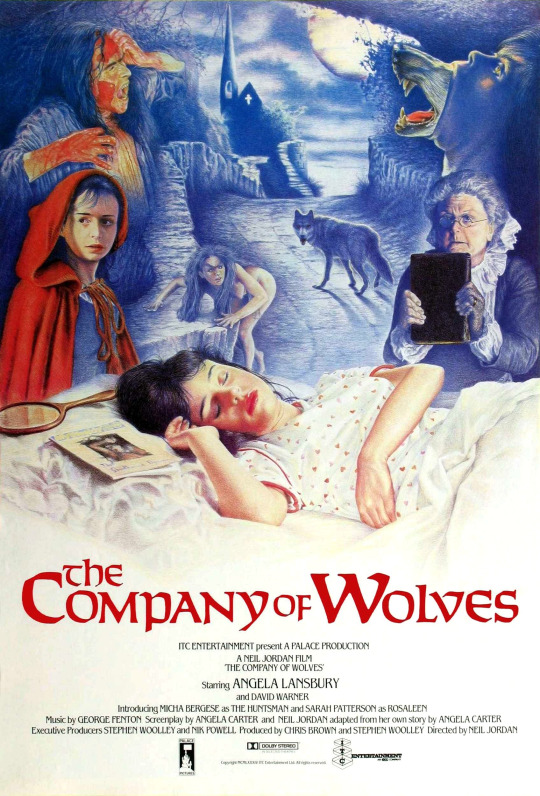
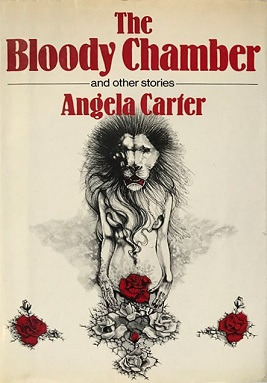
Basically, this is a short story with an adaptation that I actually (mostly) really love! The story (featured in Angela Carter’s The Bloody Chamber) is probably my favourite of the collection, and interesting look at folk tales, tradition, and breaking free of the tradition. The ending, while somewhat gruesome, ultimately tied the entire collection for me, and made me retroactively like some of the other stories better because the bluntness of this one admittedly made some of the themes I had been uncertain on clearer to me.
So, that said, it’s not surprising to me at all that this is the one the spawned a movie. The 1984 film was also co-written by Angela Carter, which is probably why it stays as true to the story’s themes as it does, and retains its feminist messaging. On top of that, the production design and special effects are fantastic, I mean check out this transformation scene (TW, Gore, like, a lot of it):
youtube
And the fairy-tale like village the characters live in feels at once whimsical and claustrophobic, which considering the ending, I’m sure is intentional. I’m being a little cagey about it because I truly think everyone should watch the movie and read the story. The story is only like ten pages long, and all you have to do to get it is click this link (Only the first 12 pages in this PDF are the actual story). The film is great too, and available on free streaming services like Tubi, so I recommend checking that out as well.
What I want to talk about though, is the themes, and I do kind of have to spoil both story and film to get there, so here it goes.
The one thing I take issue with in the film is the bookends. See, the fairy tale world we get, in the film, is really just the dream of a girl who is on her way to growing up. The opening scene is two (present-day) parents meeting their older daughter outside of a lavish mansion, and her going inside to wake her younger sister, who she calls a brat, and implies is being difficult. We then see the younger sister tossing and turning in bed, and cut to the woods. Then, at the end of the story, grandma gets eaten (as she does in the short story) and the main character runs away into the sunset with her attacker, becoming a wolf -or werewolf- herself (as she does in the short story). Then, we cut back to the young girl, and a wolf bursts through her bedroom window, and to me the metaphor was obvious: periods, right? Getting older, losing innocence, ect ect. And while I think those themes exist in the original story, I’m far more interested in the one the movie (perhaps inadvertently) sort of cuts out.
That theme is the rejection of tradition. Without the bookends, when the story ends with a young woman becoming a wolf (and running off with the wolf who killed her grandmother no less), she does not just grow up, she specifically grows out not of girlish folly, but of her village, her family, her grandmothers folksy stories. The death of the grandmother, the older generation, serves as both a metaphor for growing up and taking on a mantle, and of rejecting the old ways, the old stories, of leaving what you’ve know for “the paws of the tender wolf”. And I feel like bookends, in making granny’s death and the subsequent love of the wolf not ‘true’ events, emphasize one theme and sacrifice the other. This theme is made stronger by the way it runs throughout the entire short story collection as well. The old guard (usually fathers or elderly husbands, but sometimes simply older/immortal beings and people) die, leaving room for the next generation to flourish. It’s a theme I began to appreciate more and more as I read more and more of the stories in the collection, so it was one I was sad to see take a back seat, because there is no tradition, really, for Rosaline to shed in the film. In fact, we don’t know anything about the ‘real’ Rosaline (although it is safe to assume, I think, that she is at least fairly similar to her dream self).
I still really enjoy both, but it did interest, and disappoint me a little that the immediate metaphor the film came upon and lead into was ‘periods’ over anything else. Granted, Ginger Snaps did that too, and I also love that movie. A bit of a nitpicky thought, but one I wanted to share nonetheless, even what I think is a really great film can drop the ball on adaptation sometimes.
#my writing#books#film#reading#movies#the company of wolves#thoughts#like both are great the blatant messaging of the movie just didn't work for as well#and I just wish they had cut off those bookended scenes and I think it would be a lot better#Youtube
3 notes
·
View notes
Text
Conclusions from consuming the JJK anime so far:
shounen are getting a lot braver with their levels of violence and gore
Just watch/read Hunter x Hunter. It does everything JJK tries to do but better
Extended thoughts (and spoilers for both) below the cut:
God that's such fucking bad writing I'm sorry. Every single episode is "ohhhh fuck ANOTHER important character died!! isn't that so insane poor yuji itadori.... everythings going bad for him!!! so many innocent lives!" nonstop. Even when you think the writing will hold itself back from doing it some more it just keeps. fucking. going.
It's really sad too. JJK 0 feels like a double-edged sword because it was good! and it used that plot device really well! It felt impactful and it was unexpected and really hit me in an interesting way!
But the mangaka mustve gotten high off of the feeling of pulling out Death as a narrative device because it keeps fucking happening!
I got the stakes initially. As soon as the Gojo sealing thing happened it was conveyed perfectly clearly: Things are going bad. The stakes are high. Violence will happen. But like..... After that it's just been nonstop fluff choreography fights and likable characters dying, while Sukuna, Mahito, THE RETURN OF THE FUCKIN MASS MURDERING ASSASSIN DUDE??? and the stupid fucking volcano guy all get the attention. Every other character just gets "oh its sooooo sad they died.... arent you sad? You liked them and they were charming and had appeal and they were Good Guys.... but they made a mistake and fucked up! And Boy Oh Boy Li'l Yuji's sure gonna remember that!"
Like fuuuuuuuuck off. The more I think about it the angrier I get.
I was originally typing up a post but stopped to condense my thoughts and watch a few more eps, but: Shibuya Incident is essentially "What if Hunter x Hunter's Chimera Ant Arc did everything wrong".
What if instead of 2 or 3 incredibly important character deaths, with huge ramifications, it was basically every character beyond the main character and some villians?
Ooh and what if. Get this. Instead of all the "innocent" people in the series having some sort of arc of their own, a commentary on society that completely shuns technology not being able to solve catastrophic natural events, it's just normal people with no character or gravitas beyond them being Some Guy or Some Girl! and that's so fucked up that they die! these guys sure are bad news!
Oh and EVERY TIME one of those deaths occur? Instead of a constantly developing play on morality and humanity's evils, It's just a "Yup. This bad guy is THAT powerful" or "Yup. Yuji's friends are dying" moment. Again. And Again. And Again.
Ohhh and you know what one of the coolest parts of Chimera Ant was? When Gon, utterly consumed by rage, despair, and nihilism, sacrifices himself solely to attempt to get revenge and "justice" for somebody he depended on, who died because of his own mistakes. So lets just keep. Doing. That.
But also it's multi-layered! Because Yuji's Inner Demon is a Literal Monster Curse in Sukuna! So he even has the Inner Demon Monologuing about "Yuuuup. This is alll because of you bud. All your fault!"
I've never gotten this annoyed by any series before. To have writing that was pretty good, and a bunch of likable characters, and to just throw it out the window for boring, annoying, and if anything needlessly crass constant death.....
Like. MHA. Naruto. Bleach. Even Dragon Ball Z. Their worst sins aside from writing that just Didn't Work was getting boring. Interesting stories went away for more Crazy Wacky Fights and EVEN HIGHER STAKES.
JJK's sins feel like an intentional self-immolation. It feels like the mangaka got sick of the series and went "You know what? Fuck this" and raized everything (both metaphorically and literally).
(Also Trigun did the whole "You can't be morally upstanding when innocent people can and will die" plotline 100x better by the way)
alright i'm tapping out of JJK. i'm sorry but shibuya incident completely ruined it for me. i did not expect to get as fed up with the "woah fucked up important characters are dying!" bit but come onnnnn.
28 notes
·
View notes